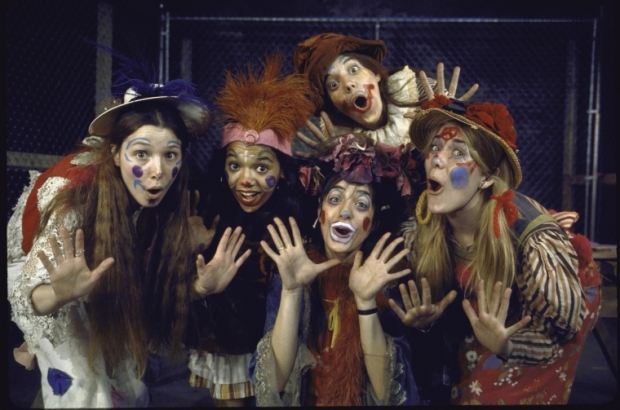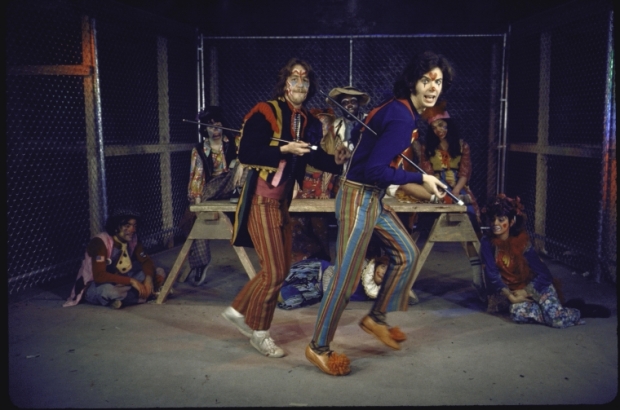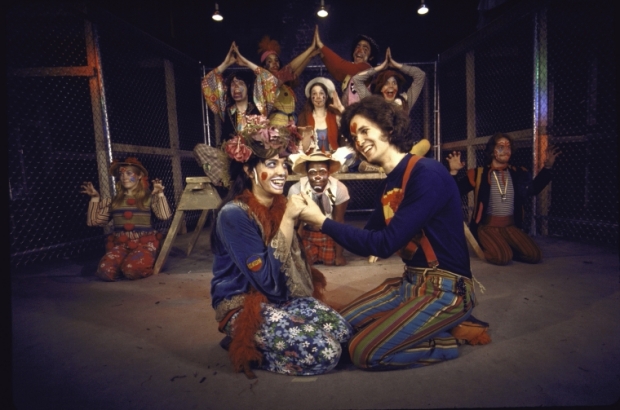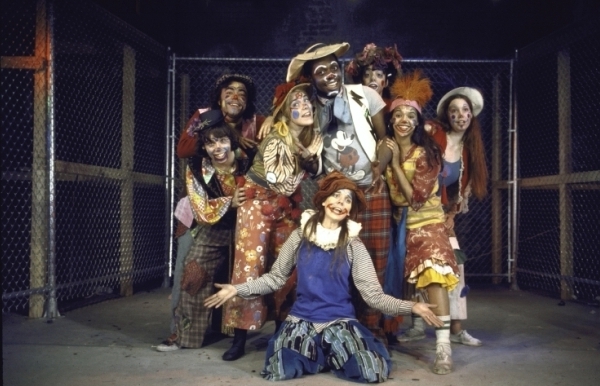Godspell at 50: Looking Back With Stars Peggy Gordon, Robin Lamont, and Stephen Nathan
Fifty years ago today — May 17, 1971 — the musical Godspell opened at the Cherry Lane Theatre in the West Village. This unlikely theater piece began its life as a master's thesis project at Carnegie Mellon University, where its creator, a young visionary named John-Michael Tebelak, drew inspiration from the Gospel of Matthew, the story of Jesus Christ, and the improvisatory techniques of Judith Malina and Julian Beck's famed Living Theatre.
So successful was the original three-day run at CMU that Tebelak brought the show to Ellen Stewart's La MaMa in the East Village. A set of commercial producers led by Edgar Lansbury and Joseph Beruh were so enticed that they brought in a young composer named Stephen Schwartz to pen a score before installing the show across town at the Cherry Lane (and later, for more than 2,000 performances, at the now-defunct Promenade Theatre). The rest of Godspell is, as they say, history. It became a movie, spawned a top 13 hit in "Day by Day," and has been seen all over the world. To appear in Godspell is often a rite of passage for high school and college students, not to mention amateur actors.
Tebelak only lived to see a portion of the show's very long-lasting success; he passed in 1985, at the age of 35, from a heart attack. But to original stars Peggy Gordon ("By My Side"), Robin Lamont ("Day by Day"), and Stephen Nathan (who played Jesus), the success of the show was well earned. They've all had a lifetime of experiences since then — Gordon with a career in theater, Lamont as a lawyer and undercover investigator, and Nathan as writer and executive producer of TV hits like Bones, Everybody Loves Raymond, and Joan of Arcadia — but they all acknowledge one thing: Godspell was lightning in a bottle.

(© Martha Swope/New York Public Library for the Performing Arts)
This conversation has been condensed and edited for clarity.
Tell me about the origin of Godspell at Carnegie Mellon.
Peggy Gordon: Carol de Giere goes into the genesis of it in luxurious detail in her book The Godspell Experience, but the way John-Michael explained it to us was that he had a truly horrible experience at an Easter Sunday church service, and what we were going to do was take the guy out of the church and stick him in a child's playground. After the prologue, where you're pontificating worldly philosophers, you'll be wiped clean of everything and will come back in as pre-adolescent children who know nothing and are taught everything by Jesus. That's basically what it was about, and it would answer a single question: Was there any spiritual sustenance to what this guy is reported to have said and done, separate from the church and ritual? We were at school and the Living Theater came out and we had a weekend of workshops with them and they taught us all of their improvisatory techniques. That was it for John-Michael. He was like, "Yeah, that's what we're doing."
Robin Lamont: We pretty much got into the improvisation of the Gospels pretty quickly, because we only had a couple of weeks, maybe two weeks, to put on the show. One of the things about Carnegie was that we were all getting prepped for repertory work. So the goal as a junior or senior was to get into the Chekhov play or the the main-stage Shakespeare. So when John-Michael came up with this wildly different and kind of odd idea, it was quite revolutionary.
Stephen Nathan: When we were at Carnegie, there was no musical theater. Television was looked down on as turning your back on the theater. We were all being trained, at great cost, to be able to leave Carnegie and starve to death at a repertory theater some place. There were two productions that were done there, one was As You Like It, which I remember people saying we should bring to New York, and that was the first time I'd heard anything like that. And then there was Godspell, which just seemed to be a natural. I had nothing to do with it at Carnegie. But John-Michael had a little cast of actors he liked working with, and we had all been together doing summer theater in Cleveland, so he reenlisted us to come to New York with a lot of the original people who did it at Carnegie.
Peggy: No, just three people: Robin, Sonia Manzano, and David Haskell.
Robin: We left school. We were all juniors. At Carnegie, we were in the small studio theater, which I don't think held more than 125 people, possibly. We did three performances because it was John-Michael's master's thesis, and by the third performance, you couldn't get in there. It was jammed. We were actually very surprised.
Stephen: Even when we opened in New York, it was a surprise. It was unlike any other rehearsal process, unlike any other show, I had been connected with prior, and since, to be honest, and I've done a million things since then. I know it's going to sound corny, but a portion of our lives, our souls, were in that show. We were doing it for the love of doing it. We learned what it was to create something not for fame, not for money, but simply for the love of the piece. There was a communion with the audience. There was a sense that we were all doing something together, and it gave it a certain life that existed only with those people who came to see it every night. It was really an extraordinary experience.
Peggy: We were so focused on manifesting John-Michael's vision. We created our own improvised dialogue, we basically created all the choreography, to manifest this beautiful labor of love. He handpicked all of us because we worked with him before. John-Michael was brilliantly conceptual but he was very dense — my joke is that you had to have worked with him at least once to understand what he was talking about.

(© Martha Swope/New York Public Library for the Performing Arts)
How did Stephen Schwartz get involved?
Stephen: We knew him from Carnegie. He left a year before I graduated. John-Michael just called him up, I think.
Peggy: No, [producers] Edgar [Lansbury] and Joe [Beruh] had heard the music to Pippin, which they passed on, but they brought him in.
Stephen: He knew the cast, so he knew what we could and couldn't do. Thank God, he wrote stuff for me that I could sing, otherwise we really would have been screwed. It was a remarkable score. I don't know that I've ever told you this, Robin, but I remember John-Michael called me up and said, "I just got the music and I want to play it for you." So I went to his place and I listened to it and I was absolutely blown away. I couldn't believe it. I said the only one that just didn't seem right, the only one I don't like, is "Day by Day." So I don't have a career in the music business. [laughs]
Robin: I was just starting to film the movie when "Day by Day" made the top 13 in the Billboard Hot 100 and I used to listen to it on the radio when I'd wake up, because it was always on. I think, perhaps, that as a young actress, it wasn't the best thing for me in terms of training. I kind of thought that a lot of stuff would come easily after that, and it didn't. But it really was an exciting, exciting time. That's why I had gone to Carnegie, and why I left and did not return. I thought, "I'm working, this is great!"
Would you say that Stephen Schwartz was the one who made it a musical?
Peggy: It was never not a musical. There were eight songs by poor Duane Bolick, who I think was a math student at Carnegie. It just didn't become what it became until Stephen Schwartz came in.
Robin: I would say that people have characterized it at Carnegie, correctly, as a play with songs, and Stephen turned it into a musical.
Peggy: I say this in every interview, because I don't know how many people know this: Stephen musicalized the prologue, which had been spoken, he wrote new music to eight songs, and he wrote five additional songs, in four weeks.
Robin: He had a sense, even at his young age, of where the upbeat numbers should go, and where you could pull it down, and what needed to happen to keep an audience engaged musically. That really was his brilliance in terms of putting it together. Some of the songs are just gorgeous, but he knew where to place them. He knew that we needed an upbeat number in the second act, which was a way to engage the audience in the fun and the comedy, and then immediately afterwards, we started the scene that goes into the Last Supper. For the audience, it was a set up, like, "We're gonna have a good time, aren't we?" And then, "No."

(© Martha Swope/New York Public Library for the Performing Arts)
Have you seen productions of it through the years? Do you go to the local high school when you see they're doing Godspell?
Stephen: I saw it when it was still running everywhere. I saw it in Paris, which was a phenomenal production. I saw it in London; wasn't crazy about the one, but the actors were great. I did see the last Broadway revival, and that was a whole different take on the show that seemed to have a whole other concept behind it in an odd way. The cast was unbelievably great and talented. I don't know whether I had some proprietary feelings about the original, but I never felt the essence of the show in the same way as I had in others that I'd seen.
Peggy: I'll just say this. We didn't have a libretto. Basically, Nina Faso created a libretto by running around and writing down everything that we did. Stephen Schwartz has written author's notes that are there both as a preamble and woven throughout the body of the libretto. They're extremely detailed. They synthesize John-Michael Tebelak's core, essential, critical concepts and it's an impeccably clear road map. So when any director reads them and thinks, "Eh, that's optional. I want to do my thing," you're off to a really bad start. But if somebody reads them and says, "Oh, I get it," if they follow it, they're off to a great start. It doesn't mean that there isn't a freedom of expression on the part of the cast and the director, but Stephen wrote these notes to basically safeguard the emotional and artistic integrity of the show.
Robin: What's interesting to me is that a lot of directors have brought an entirely different sort of theatrical vision but still kept the core of the show true to itself. That speaks to the brilliance of the music, and it also speaks to what happens when you get a real ensemble together and they're all loving the show. The spirit tends to come out. Even in a couple of high school productions where, you know, the acting is less than professional, the spirit still comes through. And I think that is really important.

(© Martha Swope/New York Public Library for the Performing Arts)










